Electronic jammers have been placed inside the Ecuador embassy in London to prevent Julian Assange having access to social media, according to news.com.au and RT.com.
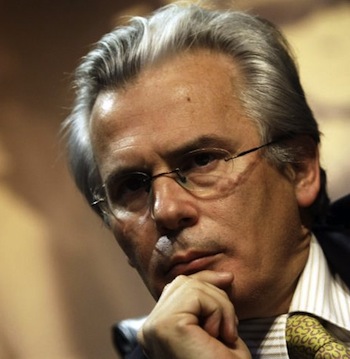 By Nikolas Kozloff.
By Nikolas Kozloff.
On a certain level, I wonder whether Baltasar Garzón, the Spanish judge who is now defending WikiLeaks founder Julian Assange, agreed to take the assignment for personal reasons.
In recent years, Garzón has come to international attention for pursuing a number of high profile international cases. In 1998 for example, the judge sought to apprehend brutal Chilean dictator Augusto Pinochet, Washington's ally during the Cold War. Not stopping there, the pugnacious judge issued an order for British authorities to detain Henry Kissinger no less.

News
- A second recommendation to court-martial Bradley was sent to Maj. Gen. Michael S. Linnington, commander of the Military District of Washington, who will make the final decision;
- The US Government again refused to allow the production of key defense witnesses;

This is a "WikiLeaks News Update", a daily news update of stories relating directly to WikiLeaks and also freedom of information, transparency, cybersecurity, and freedom of expression.
News
- allegations by Spanish Guantanamo detainees of being tortured;
- use of Spanish bases for CIA “rendition” flights.
Judge Baltasar Garzon himself faces trial, beginning January 17, on “corruption charges”. The most serious charge he is facing (exceeding authority) relates to an order issued, at the request of families, to exhume the remains of victims assassinated during the Franco regime. More than 200 international organizations condemn prosecution against him.
[Source: Dissident Voice]

News
Request to keep WikiLeaks backers' private Twitter data from US Prosecutors denied
‘War on The Internet’, panel with Jacob Appelbaum
The two major parties in control of Spanish Congress (PP and PSOE) announce that they have agreed to change the Constitution to include a maximum expenditure of 0.4% GDP on public spending. This is the first time in thirty years of the current democratic situation that the Constitution will be modified. They also plan to do so in the fastest way possible, looking to calm the market forces that are predicting doom regarding Spanish debt. Therefore, they have called for an extraordinary voting session for next Tueday, 30th of August. This has fueled an already incensed population who demand to have their say on issues in which they believe they are directly involved. As a result, the web is already alive with calls for protests so that the general public is taken into account for such an important decision. Groups of activists in Spain are already planning for protests this weekend in front of Congress. The hashtag #yoquierovotar ("I want to vote") has been a storm of outraged voices, calling for the political class to stand up and defend their right to participate by blocking the proposal unless a referendum is accepted.
 The initiative was proposed by President Zapatero and immediately backed up by the conservative opposition party PP. Already, however, voices of dissent have emerged outside and inside the Government party, with politicians stating that doing it so rapidly is going against their personal beliefs. According to Spanish law the measure needs 10% of support in Congress (35 congressmen) or in the Senate (26 senators), if not, a public referendum is mandatory.
The initiative was proposed by President Zapatero and immediately backed up by the conservative opposition party PP. Already, however, voices of dissent have emerged outside and inside the Government party, with politicians stating that doing it so rapidly is going against their personal beliefs. According to Spanish law the measure needs 10% of support in Congress (35 congressmen) or in the Senate (26 senators), if not, a public referendum is mandatory.
While Madrid is traditionally empty in August, the city is now literally packed with Catholic pilgrims of all ages, who have come from all around the world to attend the World Youth Days, presided by the Pope Benedict XVI. Authorities estimate that around 1.4 million people have flooded the city. From the very beginning the event has created resistance in the general public, as the investment of approximately 70-100 million euros is seen as exaggerated, in a time when politicians are demanding austerity measures for a country facing severe economic recession. They criticize, for example, that the centre of Madrid will be closed to traffic for more than four days, causing a lot of problems for normal citizens who have to work. Furthermore, the pilgrims have been given benefits that any unemployed Spaniard would desperately need: they have been given places to stay for free, food for free and while public transport in Madrid went up by 50% this month, being a pilgrim gives you a whopping 80% discount for all travels. This has caused major irritation in an already angry population, who are demanding answers as to why a constitutionally secular country should give this kind of support to any religion, while at the same time neglecting it’s own citizens.
The Popular March to Brussels that left the Puerta del Sol of Madrid on July 26th, is now at the Pyrenees. Until today, over one hundred people have decided to go to Brussels. The Marchers are, among other places, from Italy, Greece, Germany, France, Russia, USA, Cuba, Colombia, Mexico, Tunisia, Poland and England. Women and men of all ages are sharing this experience.
After twenty-three days on tour along towns and cities in Northern Spain, on Wednesday August 17th, early in the morning and from the city of Irun, the March will cross the border. Then, they will meet their counterparts in France at Baiona, where a warm welcome is prepared.
On Monday, August 8th, also the Mediterranean March to Brussels left the city of Barcelona in their journey to the Belgium capital. The Marchers are currently 21 and tomorrow it’s expected that several people will join up them. Besides, 12 participants have already confirmed their presence in the neighbor country, who will join up the March to accompany them to cross the border.
 In just two days, the Spanish police have spoken out against the government and in support of the indignados — while at the same time beating them up. (Photo: Iker Etxarte)
In just two days, the Spanish police have spoken out against the government and in support of the indignados — while at the same time beating them up. (Photo: Iker Etxarte)
Either the police have lost it, or the government has lost the police. Or both. Whatever way it may be, the predicted summer lull in Spain’s 3-month youth uprising has failed to materialize. So far, the holiday month of august has proven to be sizzling hot in the Spanish capital.
For the past three days, the streets of Madrid have been in the hands of the protesters — while a small army of riot police desperately cling on to Puerta del Sol and Parliament. Instead of subsiding in the wake of Tuesday’s eviction of the info booth at Puerta del Sol, the protests have rapidly and spontaneously intensified (pictures here!).
Eviction
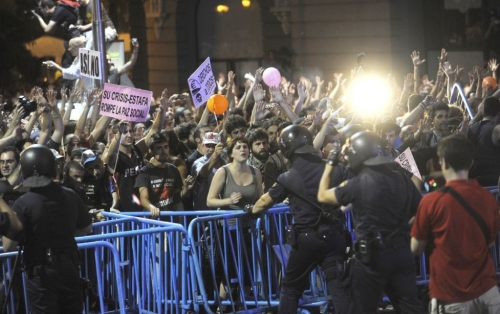 Today around 6:30 in the morning, a large police presence, consisting of national police and local police, appeared in Sol square, where the info point Sol still was present, as well as a great oil painting which some called the “new Guernika”(new version of Picasso's one at Reina Sofia Museum in Madrid) and the metal plate that read “We were asleep, we woke up, square taken”.
Today around 6:30 in the morning, a large police presence, consisting of national police and local police, appeared in Sol square, where the info point Sol still was present, as well as a great oil painting which some called the “new Guernika”(new version of Picasso's one at Reina Sofia Museum in Madrid) and the metal plate that read “We were asleep, we woke up, square taken”.
Since the people's assembly of Sol decided to dismantle the encampment, the info-point was a permanent stand to provide information related to the movement in the Square. Cleaning services arrived escorted by 20 riot police vans, their job was to clean everything up and leave no sign of the 15 May Revolution Movement at Sol.
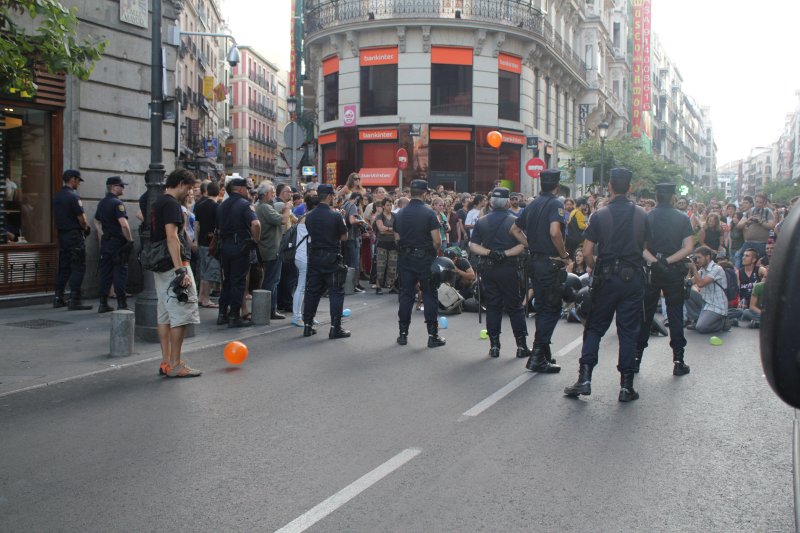
Police blocking access to #Sol Square.
Reaction of people
During the day, people organized in Assemblies in Madrid to plan what to do after the eviction of Sol. It was decided to organize an attempt of re-occupation of the square at 20:00 local time.
Originally published in Spanish, by Periodismo Humano.
Written by Patricia Simon. Photographs by Javier Bauluz.
The 15M movement of Gijón (in the north of Spain) had called for a gathering on July 7th in front of some of the city's banks to protest for their "greed and responsibility in the crisis we are living", as one of the participants stated. At that same time, Ángel T.P. was heading for the the city's court to see if his petition to delay the eviction from his house had been accepted. The eviction had been set for midday by another court, so that very morning, when he found no answer to his petition, he went with little hope to one of the permanent information points set up by the movement in front of the Town Hall. Thanks to social networking and the coincidence that a protest was being held at exactly the same time, merely one hour later 40 people were occupying the stairway of his building, stopping an eviction for the first time in Asturias.
As of July 7th, 2011, the outraged movement in Spain has already prevented almost 47 evictions, according to the Platform of People Affected by Mortgages (PAH in Spanish http://afectadosporlahipoteca.wordpress.com/), which aims to defend the "right to housing". From their website they are constantly making calls to ensure that families with financial problems avoid becoming homeless, denouncing that real estate speculation has led many families to inhumane situations. They also denounce the fact that, in Spain, around 180 evictions are executed each day, too many to be stopped.
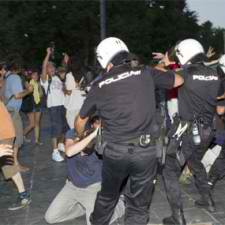 Over the past days the Spanish National Police force has coordinated to evict many of the squares that continued to be occupied by the 15M movement. The squares in Palma de Mallorca, Manacor, Santa Cruz de Tenerfe, Badajoz, Castellon, Gandia and las Palmas have been emptied forcefully and cleaned up. The last one to fall was the camp in Valencia, which was evicted early in the morning, at around 5.30 am local time and without warning. Most of the camps were small and the people staying there were coordinating the information booth left in most squares, as well as other permanent activities. This made most evictions easy and pacific.
Over the past days the Spanish National Police force has coordinated to evict many of the squares that continued to be occupied by the 15M movement. The squares in Palma de Mallorca, Manacor, Santa Cruz de Tenerfe, Badajoz, Castellon, Gandia and las Palmas have been emptied forcefully and cleaned up. The last one to fall was the camp in Valencia, which was evicted early in the morning, at around 5.30 am local time and without warning. Most of the camps were small and the people staying there were coordinating the information booth left in most squares, as well as other permanent activities. This made most evictions easy and pacific.
As the protests around Spain come to an end, the signs of weakness shown by the 15M movement over the past weeks - the frustration against the slow assemblies, the possibility of violence inside of the pacifist ideals (violence in Barcelona http://www.europeanrevolution.net/?p=539) or the lifting of the camps - have been forgotten after the massive protest carried out in over 30 cities nationwide. According to the techno ant map (here ) the protest happened in 98 cities internationally. The number of protesters is, as always, hard to know for certain. The main media source in Spain, El Pais, claims that around 200,000 people participated in the major protests, making the number probably higher.
In Barcelona a whopping 100,000 people marched according to most sources. It was larger than in Madrid where 35,000 to 50,000 people participated in the event. Some say, however, that over 100,000 were present throughout the day. It is truly hard to tell. Six columns initiated the protest marching towards Congress from different neighborhoods around Madrid.
Madrid today:
At least 36 people have been injured after Spanish policed dispersed thousands of protesters blockading the first day of the Catalan Parliament in Barcelona. The regional government is set to pass many measures that will cut spending to social services by up to 10 percent. The protests are a continuation of the M-15 movement, which is demanding a more participatory democracy and social justice. Late on Tuesday afternoon, June 14th, the police forcibly evicted hundreds of people from the public park, where protests were planning to camp. However, the people remained there, and a massive popular assembly of several thousand was held at the gates.
The camps slowly disappear
After weeks of tension and negotiations last week the General Assembly of Puerta del Sol (Madrid) and Plaza Catalunya (Barcelona) agreed to lift camp today. Starting early in the morning the squares have been progressively stripped bare and will be lifted completely this evening, almost 25 days after they started. In Madrid, the makeshift furniture, tents and posters have been slowly removed all week long. Today various trucks are being loaded and the last remaining parts are being taken down, the 4000 books donated to the library will end up in various social centers, while most of the furniture will be recycled or destroyed by a disposal vehicle brought in by the city authorities. Some of the protestors, in both cities, have decided to remain, arguing that initial idea was to stay indefinitely. Their freedom to do so has been respected but they fear that it will result in police action. Some of them also proposed the idea of making it an itinerant camp that could move through squares around the city but a consensus was not achieved on this matter. It is also to be seen if a permanent information booth will be installed and left behind.
(Video of the demonstration that took place this night in the main street of Madrid (Gran Via) to end Plaza Sol Camp)
Today at 13.30 hours the Spanish national police attacked protesters who had been occupying the steps of parliament since last night. This comes after the official page for the camp in Valencia called for a protest before the Corts Valencianes, the main legislative organ of the Comunitat Valenciana. Today the new members were to be sworn into their charges after being elected on the past 22nd of May, and many of them, mostly belonging to the right wing Partido Popular, did so even though they are currently facing serious corruption charges.
Packing tents
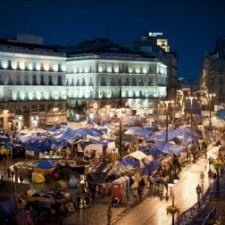 The M-15 movement in Madrid has decided tonight, after a four hour long general assembly that it will end its occupation of ‘La Puerta de Sol’ (main square in Madrid) on Sunday the 12th of June. The way in which this process will be carried out will continue to be debated and it is likely that a small permanent information office will remain. The movement will also continue to hold daily general assemblies in the square and it acknowledged that some people may decide to continue the occupation as individuals.
The M-15 movement in Madrid has decided tonight, after a four hour long general assembly that it will end its occupation of ‘La Puerta de Sol’ (main square in Madrid) on Sunday the 12th of June. The way in which this process will be carried out will continue to be debated and it is likely that a small permanent information office will remain. The movement will also continue to hold daily general assemblies in the square and it acknowledged that some people may decide to continue the occupation as individuals.
The reasons given for ending the occupation are varied. It is partly to address the growing problems associated with the camp, in regards to security and hygiene. However, more importantly it is part of strategy for decentralizing expanding the movement. This has already began, with a national day of action planned for the 19th of June and the creation of popular assemblies in hundreds of suburbs and communities all over Spain. The occupation was in its 24th day and the M-15 movement has vowed to continue its struggle for participatory democracy and social justice.
Theme by Danetsoft and Danang Probo Sayekti inspired by Maksimer